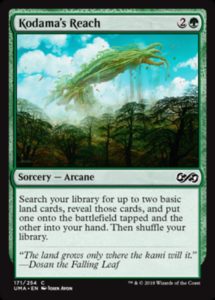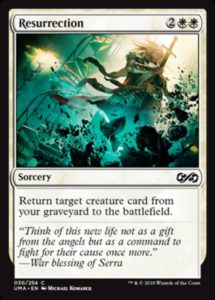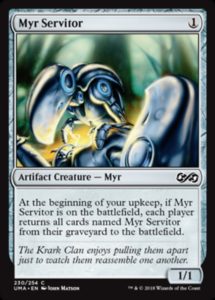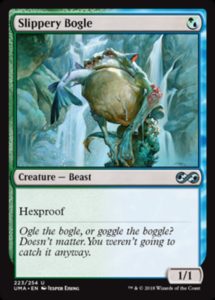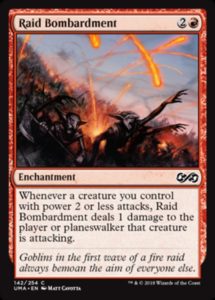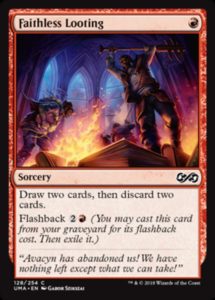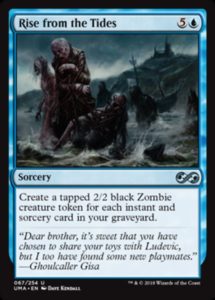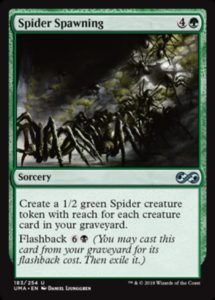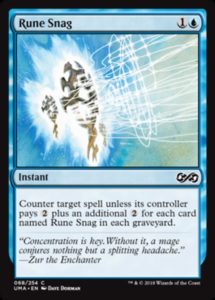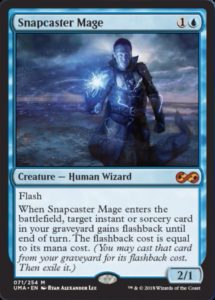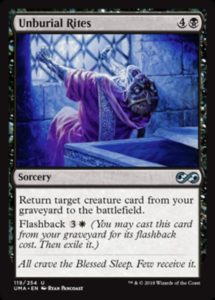This weekend, I’ll be speaking at PAX Unplugged, and that means I’ll also be playing in Ultimate Masters preview events! Accordingly, that means we’ll need a guide for how draft the format.
Ultimate Masters follows the lead of Modern Masters 2017, Iconic Masters, and Masters 25 in that there are a whole swath of potential synergies, rather than the ten explicit archetypes of Modern Masters 2013 & 2015 and Eternal Masters. In our overview of the format, we’ll focus exclusively on commons and uncommons since rares are harder to come by (and often included because of their reprint value, rather than contribution to Limited). We’ll stick to either enablers, payoffs, or cards that will likely overperform in each particular archetype rather than producing a comprehensive list of every card that could matter. Accordingly, I’ve avoided more minimal payoffs like Ghoulcaller’s Apprentice in graveyard strategies.
With that said, let’s jump into the archetypes!
Ramp
Primary Color: Green
Secondary Color: Blue
Tertiary Color: Taste the rainbow
Blue: Dreamscape Artist
Green: Kodama’s Reach (bolded as it’s a critical card to the archetype; we’ll be doing this going forward), Penumbra Wurm, Walker of the Grove
Multicolor: Urban Evolution, Vengeful Rebirth
Colorless: Artisan of Kozilek, Prismatic Lens, Vessel of Endless Rest, Ulamog’s Crusher
Accelerating your land drops and fixing your colors is a staple of green and Masters sets. Ramp was in green-blue in MMA2013, red-green in MMA2015, and in all five colors in the heavily multicolor MMA2017. Heck, every color got to play with mana acceleration in Iconic Masters, which had four common two mana accelerants. Ramp is clearly back in UMA, combining the Eldrazi of MMA2015 with the arcane of MMA2013.
Dreamscape Artist and Kodama’s Reach are the primary ramp enablers and the two massive non-rare Eldrazi are the archetype-specific rewards. Ramp suffers a bit as the powerful mutlicolor uncommons skew heavily towards being either archetype-specific (so splashing them isn’t a great idea) or Constructed plants like Countersquall (which are powerful, but not what ramp wants). Vengeful Rebirth was a fantastic ramp reward in MMA2015, but in UMA it lacks the easy combo in Fiery Fall. Moreover, there is neither a Savage Twister nor Imperiosaur analogue to really help Ramp stabilize.
There just don’t seem to be nearly as many tools for ramp to play with in Ultimate Masters. There’s enough to make a big mana goodstuff deck, but the majority of your haymakers are likely to be Ulamog’s Crushers rather than a swath of midrange threats and splashable bombs.
Reanimator
Primary Color: White
Secondary Colors: Blue, Black
Tertiary Color: Red
White: Angelic Renewal, Miraculous Recovery, Resurrection
Blue: Aethersnipe, Dreamscape Artist, Frantic Search Skywing Aven
Black: Apprentice Necromancer, Buried Alive, Olivia’s Dragoon, Unburial Rites
Red: Faithless Looting, Mad Prophet, Sparkspitter
Colorless: Artisan of Kozilek, Ulamog’s Crusher
Multicolor: Angel of Despair
A classically black archetype, Reanimator is in white this time around and has way more support than it did in EMA. Your goal is simple: combine Resurrection, discard outlets or self-mill from any of the other four colors, and finishers like Ulamog’s Crusher and Angel of Despair. This is the all-in combo deck of the format which can have disgustingly powerful starts.
Aristocrats/Attrition
Primary Colors: White, Black, Red
Secondary Colors: Blue
White: Martyr of Sands, Sigil of the New Dawn, Tethmos High Priest
Blue: Marang River Prowler, Stitcher’s Apprentice
Black: Apprentice Necromancer, Bloodflow Connoisseur, Shirei, Shizo’s Caretaker, Slum Reaper
Red: Furnace Celebration, Hissing Iguanar, Magmaw, Malevolent Whispers (it has Madness, but doesn’t seem to fit into that shell nearly as well, whereas here, you steal and then sacrifice creatures), Sparkspitter
Green: Fecundity
Colorless: Myr Servitor
Multicolor: Angel of Despair, Garna, the Bloodflame
These are three different archetypes under one umbrella (a theme you’re going to see more of as we go), but all do the same thing: turn your creatures’ deaths into value.
You can be an attrition deck with Sigil of the New Dawn that grinds out value as creatures naturally die in combat. You can use Shirei, Shizo’s Caretaker in conjunction with self-sacrificing cards like Heap Doll, Fume Spitter, and Martyr of Sands to creature a value engine by themselves or with Hissing Iguanar. You can combine Furnace Celebration with repeatable sacrifice outlets like Magmaw, Bloodflow Connoisseur, Sparkspitter, or Stitcher’s Apprentice to get free Shocks.
Or you can combine these three shells together for increased effect, possibly mixing them with Reanimator as well.
Heroic/Auras
Primary Colors: White, Green
Secondary Color: Blue, Red
White: Conviction, Heliod’s Pilgrim, Hero of Iroas, Hyena Umbra, Lotus-Eye Mystics, Phalanx Leader, Skyspear Cavalry, Tethmos High Priest, Wingsteed Rider
Blue: Defy Gravity, Eel Umbra, Flight of Fancy, Iridescent Drake, Unstable Mutation, Whirlwind Adept,
Black: Mark of the Vampire
Red: Akroan Crusader, Arena Athlete, Reckless Charge, Soul’s Fire, Undying Rage
Green: Boar Umbra, Hero of Leina Tower, Shed Weakness (there’s… really not a lot of Persist in this set), Snake Umbra, Spider Umbra, Staunch-Hearted Warrior, Travel Preparations, Wild Hunger
Hybrid: Double Cleave, Slippery Bogle
These are two distinct archetypes that are mostly doing the same thing: going tall on one or a small number of creatures. Heroic synergizes very well with auras (and flashback spells), and there are auras, enchantment tutoring, enchantment recursion, and enchantment removal aplenty in Ultimate Masters. Alternatively, you can play Modern Bogles by suiting up a Slippery Bogle with a couple auras and hoping your opponent doesn’t have a Slum Reaper or Chainer’s Edict before you deploy some decoys.
Go Wide
Primary Colors: White, Red
Secondary Color: Green
White: Phalanx Leader, Rally the Peasants
Red: Akroan Crusader, Anger, Molten Birth, Raid Bombardment
Green: Travel Preparations, Wild Hunger
It’s important that formats have an aggro deck to serve as fun police, preventing shenanigans and goodstuff decks from dominating everyone. White, Red, and Green all have different tools to help you go wide, be they just playing creatures and Travel Preparations/Rally the Peasants, using Heroic (but focusing more on targeting Phalanx Leader than Wingsteed Rider), or by combining Raid Bombardment with Shirei, Shizo’s Caretaker to damn your opponent even if they block.
Madness
Primary Colors: Blue, Black, Red
Secondary Colors: White, Green
White: Spirit Cairn, Wandering Champion
Blue: Circular Logic, Dreamscape Artist, Frantic Search, Just the Wind, Skywing Aven
Black: Ghoulsteed, Grave Scrabbler, Olivia’s Dragoon, Sanitarium Skeleton, Twins of Maurer Estate
Red: Anger (sort of), Conflagrate, Faithless Looting, ], [mtg_card]Firewing Phoenix">Fiery Temper[/mtg_card], [mtg_card]Firewing Phoenix, Mad Prophet, Reckless Wurm, Sparkspitter
Basking Rootwalla, Groundskeeper, Hooting Mandrills, Wild Mongrel
These decks have a common goal: discard cards for an effect, then get additional value from the discard or negate the discard completely. Mad Prophet discounts Fiery Temper by two mana and draws you a card, and it does the same for Reckless Wurm or even Twins of Maurer Estate (basically, Madness usually means you draw a card, and usually get to cast a spell at a discount). You can also use discard to fuel Delve, in conjunction with Flashback or Spirit Cairn (which otherwise has little support in white, but also can hose this archetype), as a component in Reanimator, or with our next two archetypes.
Graveyard Shenanigans
Primary Colors: Blue, Green
Secondary Colors: Black
Blue: Archaeomancer, Deranged Assistant, Forbidden Alchemy, Frantic Search, Laboratory Manic, Living Lore, Rise from the Tides, Stitched Drake, Sultai Skullkeeper, Treasure Cruise
Crow of Dark Tidings, Ghoulsteed, Golgari Thug, Gurmag Angler
Become Immense, Boneyard Wurm, Hooting Mandrills, Golgari Brownscale, ], [mtg_card]Spider Spawning">Satyr Wayfinder[/mtg_card], [mtg_card]Spider Spawning
There are two distinct archetypes (and sub-archetypes with Laboratory Maniac), but they encourage you to do the same thing: dump your library into your graveyard. Spider Spawning rewards you for creatures and Rise from the Tides rewards you for spells, but they value many similar cards. Both play well with Delve and discard, and both go ‘infinite’ with two copies of Stream of Consciousness (instead of the more reliable Memory’s Journey plus Runic Repetition chain). Spider Spawning not having Armored Skaab, Dream Twist, or Mulch is a big deal (Crow of Dark Tidings is much slower and a worse defensive card), but Satyr Wayfinder is a really, really good alternative.
It’s worth noting that there are very, very few way of interacting with these archetypes. Heap Doll, Vessel of Endless Rest (sort of), Beckon Apparition, and the almighty Offalsnout are the only ways you can exile cards from your opponents’ graveyards, so the ding Spider Spawning got in speed and consistency is offset by the fact that you must race it and will struggle to ever gum up its engine. Rise from the Tides wasn’t as good in its appearance, but it’s a whole lot more appealing with Frantic Search allowing you to turbo through your deck while also Madnessing spells.
Spell Control/Tempo
You can take the self-mill out of the spells deck and still play a spell-heavy control deck using Madness, Flashback spells, Rune Snag, and Treasure Cruise to grind out value. You can build a spell combo deck that instead of killing with Rise from the Tides, kills with Thermo-Alchemist or Young Pyromancer. The key cards for this archetype are basically a hodgepodge of the cards for Graveyard Shenanigans and Madness, so I won’t relist them here.
And those are our broad archetypes. There’s one more thing to consider when evaluating a format.
Removal
In order to know what a Limited format allows, it’s important to know what the state of removal looks like. After all, going tall on a Wingsteed Rider sure looks silly if Swords to Plowshares and Doom Blade are common. So, here are all the common and uncommon removal spells, sorted by color and rarity. I’ve made a point of including enchantment removal, because, well, there are a lot of enchantments that are going to go on Slippery Bogles and you’ll need to deal with them.
White:
Faith’s Fetters, Ronom Unicorn
Blue:
Black:
Fume Spitter, Last Gasp, Slum Reaper, Twins of Mauer Estate, Unholy Hunger
Red:
Conflagrate, Furnace Celebration, Rolling Temblor
Green:
Crushing Canopy, Prey Upon, Wickerbough Elder
Multicolor:
Angel of Despair, Blast of Genius, Golgari Charm, Warleader’s Helix, Vengeful Rebirth, Murderous Redcap
It’s a Masters set, so each color has access to several solid removal spells. Notably, white has no cheap interaction (just Gods Willing as a good trick and and Repel the Darkness as a bad trick) and Prey Upon should be a bit better than normal because of how well it synergizes with Heroic.
Final Thoughts
As you might have noticed, Ultimate Masters has an enormous focus on the graveyard and a moderate enchantment theme. It does not have discrete archetypes, but broad patterns of play full of micro-interactions. The multicolor cards are not signposts dictating what each color pair is about, but tools available to different archetypes. All sorts of chicanery is possible, from red-white Madness-control deck to a blue-red Heroic aggro to green-white reanimator.
This hodgepodge approach to archetypes is half my cup of tea—I love dynamic pick orders (which folks in the same colors can value cards very differently), but I much prefer formats with distinct color pairs and a few shenanigans decks than soupy formats where all colors touch all archetypes. Be aware that this format is likely about choosing a broad stroke, rather than recognizing what color pairs are open. You’ll need to choose whether you want to play with your graveyard or battlefield, and whether you’re trying to go tall with a Bogle/Resurrection/Young Pyromancer or wide with Spider Spawning, Raid Bombardment, or Phalanx Leader.
Second, be aware that many cards have old templating. Iridescent Drake can take auras from both your and your opponent’s graveyard. Spirit Cairn works on both your discard and your opponent’s (so if your opponent has a Spirit Cairn, be mindful of their mana when you discard cards). It’s always good practice to read all players’ cards to know what they do, but more important to do so when dealing with decades-old design sensibilities.
Also, Madness is funky. You cannot respond to your opponent discarding Just the Wind by exiling it with Heap Doll. The helpful reminder text states that you discard the card into exile, but it didn’t always work that way and folks will likely make some mistakes. Again, read your cards and your opponents’ cards. This is a Masters set spanning twenty five years of Magic, so there’s a lot to unpack.
And there you go. Your full guide to the UMA format. If I’ve missed a few cards in any given archetype, I apologize—there’s a lot of stuff going on in this set and no one will have a chance to play with it until this weekend—and I rewrote and recombined the archetypes over a dozen times as I tried to keep this article (relatively) short. If I’ve missed an entire archetype, well, whoops! This is a funky set. Hopefully it’s a good deal of fun for everyone at PAX Unplugged this weekend, and for everyone else once the set releases.
And, as always, thanks for reading.
P.S. If I’ve missed an archetype, it’s probably Miming Slime‘s. Seriously, what’s it there for? An extra card for Heroic? A win-more for Bogles? Only the Slime knows, and it ain’t saying.
—Zachary Barash is a New York City-based game designer and the commissioner of Team Draft League. He designs for Kingdom Death: Monster, has a Game Design MFA from the NYU Game Center, and does freelance game design. When the stars align, he streams Magic.
His favorite card of the month is Vedalken Entrancer. It’s a grindy, grindy card, combining reasonable but unexciting stats with a weak ability that can nevertheless win the game. It functions slowly enough to not take over the game, but its combination of defense and inevitability make for a solid card without being broken.

